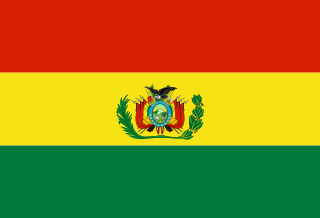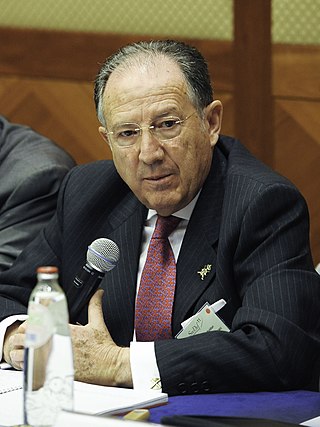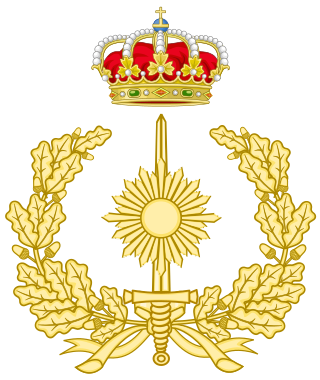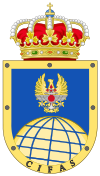
The Angolan Armed Forces or FAA is the military of Angola. The FAA consist of the Angolan Army, the Angolan Navy and the National Air Force of Angola. Reported total manpower in 2021 was about 107,000. The FAA is headed by the Chief of the General Staff António Egídio de Sousa Santos since 2018, who reports to the minister of National Defense, currently João Ernesto dos Santos.

The Indonesian National Armed Forces are the military forces of the Republic of Indonesia. It consists of the Army (TNI-AD), Navy (TNI-AL), and Air Force (TNI-AU). The President of Indonesia is the commander-in-chief of the Armed Forces. As of 2023, it comprises approximately 400,000 military personnel including the Indonesian Marine Corps, which is a branch of the Navy.

The Armed Forces of the Philippines (AFP) are the military forces of the Philippines. It consists of three main service branches; the Army, the Air Force, and the Navy. The President of the Philippines is the Commander-in-Chief of the AFP and forms military policy with the Department of National Defense, an executive department acting as the principal organ by which military policy is carried out, while the Chief of Staff of the Armed Forces of the Philippines serves as the overall commander and the highest-ranking officer in the AFP.

The Portuguese Armed Forces are the military of Portugal. They include the General Staff of the Armed Forces, the other unified bodies and the three service branches: Portuguese Navy, Portuguese Army and Portuguese Air Force.

The Bolivian Armed Forces are the military of Bolivia. The Armed Forces of Bolivia are responsible for the defence, both of external and internal, of Bolivia and they are constituted by Bolivian Army, the Bolivian Air Force and the Bolivian Navy. All these institutions depend on the Ministry of Defence of this country.

The Imperial General Headquarters was part of the Supreme War Council and was established in 1893 to coordinate efforts between the Imperial Japanese Army and Imperial Japanese Navy during wartime. In terms of function, it was approximately equivalent to the United States Joint Chiefs of Staff and the British Chiefs of Staff Committee.

The Joint Chiefs of Staff (JCS) is the body of the most senior uniformed leaders within the United States Department of Defense, which advises the president of the United States, the secretary of defense, the Homeland Security Council and the National Security Council on military matters. The composition of the Joint Chiefs of Staff is defined by statute and consists of a chairman (CJCS), a vice chairman (VJCS), the chiefs of the Army, Marine Corps, Navy, Air Force, Space Force, and the chief of the National Guard Bureau. Each of the individual service chiefs, outside their JCS obligations, works directly under the secretaries of their respective military departments, e.g. the secretary of the Army, the secretary of the Navy, and the secretary of the Air Force.

The chairman of the Joint Chiefs of Staff (CJCS) is the presiding officer of the Joint Chiefs of Staff (JCS). The chairman is the highest-ranking and most senior military officer in the United States Armed Forces and the principal military advisor to the president, the National Security Council, the Homeland Security Council, and the secretary of defense. While the chairman of the Joint Chiefs of Staff outranks all other commissioned officers, the chairman is prohibited by law from having operational command authority over the armed forces; however, the chairman assists the president and the secretary of defense in exercising their command functions.

The Joint Command of the Armed Forces of Peru (CCFFAA) is the executive agency of the Ministry of Defence of Peru in charge of the Armed Forces. The current President of the Joint Command is General David Ojeda Parra.

The Ministry of Defence is the government body of the Italian Republic responsible for military and civil defence matters and managing the Italian Armed Forces. It is led by the Italian Minister of Defence, a position occupied by Guido Crosetto since October 2022.

The Ministry of National Defense is the cabinet-level administrative office in charge of "maintaining the independence and sovereignty" of Chile. It is also charged with planning, directing, coordinating, executing, controlling and informing the defense policies formulated by the President of Chile. The minister supervises all the Chilean armed forces. It is Chile's ministry of defence.

The Ministry of Defence (MINISDEF) is the department of the Government of Spain responsible for planning, developing and carrying out the general guidelines of the Government about the defence policy and the managing of the military administration. It is the administrative and executive body of the Spanish Armed Forces.

The Chief of the Defence Staff is the highest-ranking military officer in the Spanish Armed Forces and is the principal military advisor to the Prime Minister, the Minister of Defence, the National Defence Council and the National Security Council. It is the fourth military authority of the country after the Monarch, the Prime Minister and the Minister of Defence because the Secretary of State for Defence and the Under-Secretary of Defence do not have military authority.

The Chief of Staff of the Army (JEME) is a military office held by a four-star general in the Spanish Army. Because of this, the JEME is the principal advisor to the Chief of the Defence Staff (JEMAD) on ground warfare and it is also an advisor to the Minister of Defence, the Secretary of State for Defence (SEDEF) and the Under-Secretary of Defence (SUBDEF).

Félix Sanz Roldán is a retired Spanish Army general and intelligence officer who served as Director of the National Intelligence Centre (CNI) from July 2009 to July 2019. He served as Chief of the Defence Staff (JEMAD) of the Spanish Armed Forces during the first government of prime minister José Luis Rodríguez Zapatero (2004–2008).

The Joint Cyberspace Command (MCCE), known until 2020 as Joint Cyber-Defence Command (MCCD), is a Spanish cyberspace service of the Defence Staff responsible for planning and carrying out the actions related to cyber defence in networks and information and telecommunications systems of the Ministry of Defense or others that might be entrusted, as well as contributing to the adequate response in cyberspace to threats or aggressions that may affect to the National Defense.

The Defence Staff, based in Madrid, is an organ of the Ministry of Defence that operates as an auxiliary to the Chief of the Defense Staff (JEMAD) within the organic structure of the Spanish Armed Forces and in a military hierarchical position of dependence on the former.

The Office of the Comptroller General of the Defence is a department of the Ministry of Defence of Spain that exercises the internal audit of the economic and financial management of the Ministry and of the public agencies dependent on it. Likewise, it is responsible for acting as the military notary in the form and conditions established by the laws and for advising in matters of its competence to the superior and directive departments of the Ministry. The Office is integrated in the Undersecretariat of Defence but it reports to the Comptroller General of the State.
The Chief of the Joint Defence Staff (JEMACON) is a high-ranking military officer. The JEMACON is the closest assistant and advisor to the Chief of the Defence Staff and it is appointed by the Monarch at the request of the Minister of Defence.

















